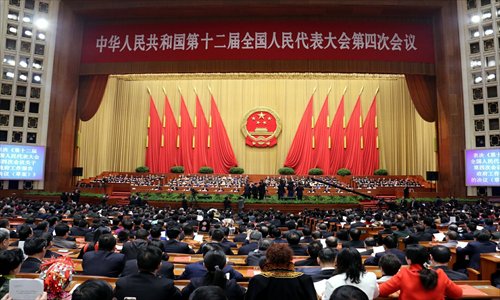Time to speak up
Advisors encouraged to be vocal in two sessions discussions

Deputies attend the closing meeting of the Fourth Session of the 12th NPC at the Great Hall of the People in Beijing on Wednesday. Photo: IC
A few days after the opening ceremony of the annual two sessions of China's top legislative and political advisory bodies on March 3, reporters began to complain in WeChat groups about how legislators and advisers were some more cautious in dealing with interviews this year.
My first interview request to a usually outspoken political adviser was rejected - much to my surprise, since I had not yet even briefed him on my questions: I had actually planned to ask for his opinion on the difference between making "groundless" comments on national policies and discussing political affairs, as the latter is part of the duties of the Chinese People's Political Consultative Conference (CPPCC).
Then another CPPCC member refused to answer my questions, politely saying that he had just moved into his position and was not familiar enough with the advisory body just yet.
Implemented on January 1, the new rules ban Party members from making "groundless" comments on national policies online or in publications or at seminars that are "damaging to Party unity." The rules will also punish those who defame the nation or Party and State leaders. Party members who decide to publicly comment on issues that they have "no place" to discuss will also be subject to punishment.
Even though the ban on "groundless" comments only applies to Communist Party of China (CPC) members, some CCPCC advisers refused to give their opinion on the rule, giving the excuse that they are not CPC members.
Almost every year, even before I become a reporter myself, media outlets have been urging advisers and legislators to speak out for the voters they represent, instead of merely giving applause and voting "yes" during the two sessions.
The People's Daily wrote on its app's front page that National People's Congress (NPC) deputies and CPPCC advisors gather in Beijing to supervise the government and participate in and discuss political affairs. "If you only applaud and nod for approval, democracy cannot be demonstrated," it said, calling on deputies and advisors to question the authorities, news portal news.qq.com reported.
Even though Liu Jiaqiang, vice chairman of the Revolutionary Committee of the Chinese Kuomintang, told news site tuanjie.com that advisers are encouraged to express different opinions and divergence will not be treated as destroying unity, such incidents seem to be warning NPC delegates and CPPCC members to keep their controversial opinions to themselves.
However, legal experts have argued otherwise, as they stressed that the new Party rules - dubbed the strictest - are not against free speech.
Party members are welcome to discuss and criticize before major decisions are announced. They can also file reports and other kinds of notices to make their opinions known after decisions are announced, Deng Lianfan, an anti-graft expert from the Law Society of Hunan Province, told the Global Times in a previous interview.
Liu noted that guidelines on strengthening the democratic consultation mechanism has effectively guaranteed the function of CPPCC as a consultative body to collect public opinion, advise and help ease conflicts.
"The political advisory mechanism is an important part of democracy with Chinese characteristics and advisers' right to get involved in political affairs has been guaranteed. But there are baselines for CPPCC members to participate and discuss political affairs. On major issues such as ethnic unity and national integrity, there are rules stipulated in the Constitution that we must follow," Zhu Zhengfu, a CPPCC member, also a Guangzhou-based lawyer, told the Global Times.
It is widely known that the CPC has a tradition of encouraging free expression within the Party, especially criticism and self-criticism - a term commonly used in governmental meetings. In the modern era, a greater diversity of opinions will exist in China's complex society as the nation has pledged to further opening up and vowed to uphold innovation - both of which are destined to bring in new ideas that may clash with old ones, but I hope these voices will be allowed to be heard as many of them may not be "groundless."
Read more in Special Coverage: